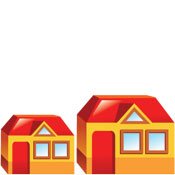Americans tend to think that bigger is better when it comes to building a home. The average home size in the United States has almost tripled since 1950, according to the National Association of Homebuilders.
In contrast, the average home in Great Britain is about 70 to100 meters, which translates to roughly 750 to1,000 square feet. In Japan, the average home size is 1,310 square feet, but 850 to 900-square-foot apartments are the norm in large cities. The living space for most people in Shanghai, China, is 70 square feet each. Five adults and two children, on average, occupy a typical two-room apartment with a large hallway, a kitchen and bathroom.
Calculate Your Living Space
When building a new home or choosing a home to buy, keep in mind that the smaller it is, the better, because it will be cheaper to buy, and to heat and cool. Do a bit of simple math to figure out how much space you really need.
• Jot down everything that you do in your daily routine. Include things like cooking, eating, recreation, sleeping, washing, storage and other parts of your routine activities.
• Measure how much space you currently have to do those actions and write down the square footage for each activity.
• Decide how much room you actually need to do those activities. You might need a bit less space than you think. Add all the estimated numbers. This will give you an estimated number of square feet needed in your new home.
Source: Dan Maginn, an architect from Kansas City, Mo. You can find these ideas and more tips on how to live affordably at http://www.good.is/post/square-feat-foot-steps/.
Where do I put my stuff?
In the United States at the end of 2008, more than 51,250 storage facilities provided 2.35 billion square feet for consumer use, the Self Storage Association reports. That amounts to 7.4 square feet of self-storage space for every man, woman and child in the U.S. These facilities made an estimated $20 billion in sales in 2008.
That Stinks!
Average Trash Output
The average American produces about 4.4 pounds of garbage per day, according to the Environmental Protection Agency. That amounts to 29 pounds of trash weekly, and about 1,600 pounds of waste yearly.
The average Mississippi household produces 1.4 tons of trash each year, says Buford Clark of Waste Management Inc. If you were to factor in yard trash such as limbs and other debris, that number would increase to about 1.7 tons per year.
Clark said that the average Mississippian recycles about 8.8 pounds per month.
Tips On Going Green in a Not-so-Green Home
• Compost your vegetables.
• As appliances break, replace them with more efficient machines.
• Make sure that the "envelope" of the home is tight. Check the seal on windows and doors to cut down on drafts.
• Double-pane windows are more efficient than single-pane; the air between the glass provides insulation.
• Put curtains on the south side of your house to cut down on heat.
How to Improve Your Living Space
• Declutter. If your room feels crowded, check to see if there is anything you can get rid of to change the feel. Too much furniture, or furniture that is unnecessarily large, can make a room feel crowded. Make sure you don't have excess.
• When cleaning, find a space for everything, and make sure all items have a home. If they aren't important enough to warrant a home, they probably aren't important enough to keep.
• If you don't think you have enough space, think about renovating. Cheap, organic materials can be found at most hardware stores. Most projects can be done over the course of time with minimal effort, and you'll be surprised how easy it is to change the look of a room by yourself.
Feng Shui
The 3,000-year-old Chinese art of feng shui is all about creating flow and balance in your environment. Its principles allow you to create living spaces and workspaces in harmony with nature and living energy, called chi, to promote personal peace and prosperity.
With feng shui, you use positioning, color, art, lighting, natural objects and lots of common sense.
• Spaces become more conducive to fulfilling their primary purpose, whether it be calming and relaxing, or energizing and creative. Create a power position in your office, for example, where you can see entrances and windows, and have your back to a wall.
• Spaces become less cluttered as you adapt to life's transitions, letting go of the old to make room for the new. Repair broken things, and remove or replace outdated things, including items that hold negative memories.
• Spaces become easier to navigate and keep clean. Removing the sharp corners from a piece of furniture where you're constantly banging your shin, for example, makes you happier to be in the room. Having a clear path to the closet makes it easier to make sure your clothes are hung up instead of tossed on the floor.
More information: http://www.westernschooloffengshui.com



Comments
Use the comment form below to begin a discussion about this content.
comments powered by Disqus